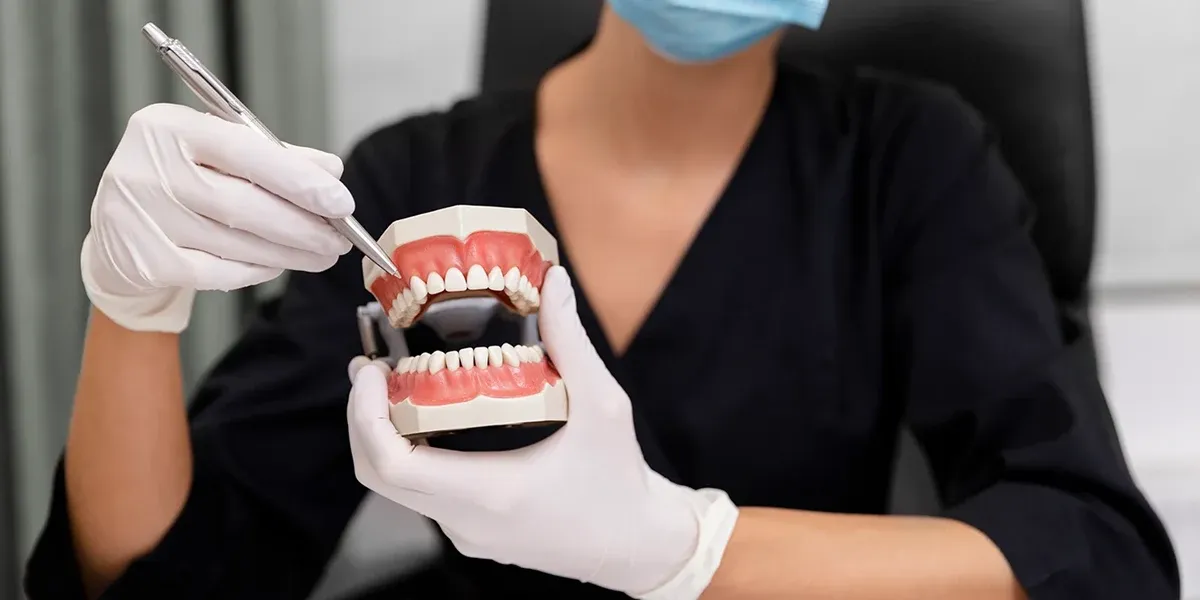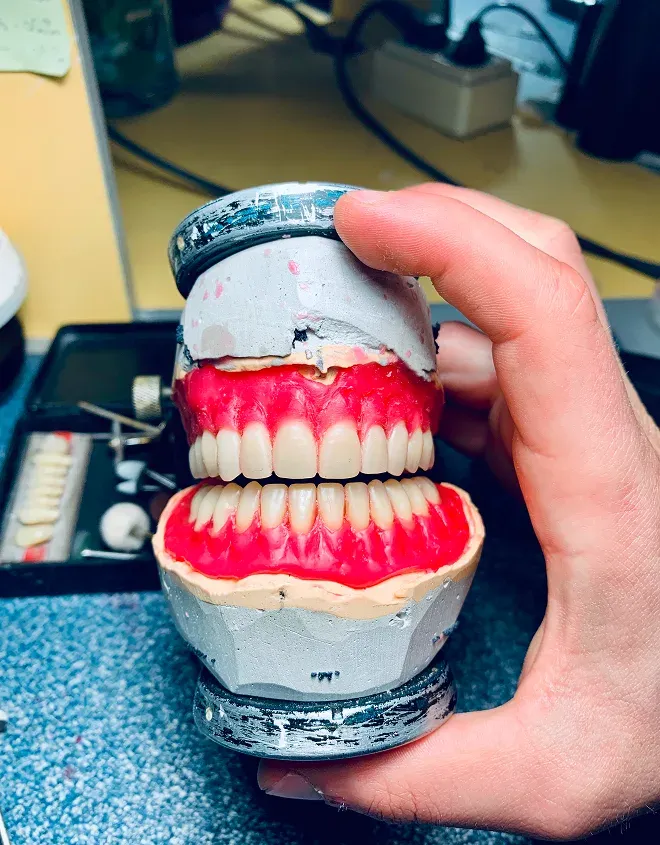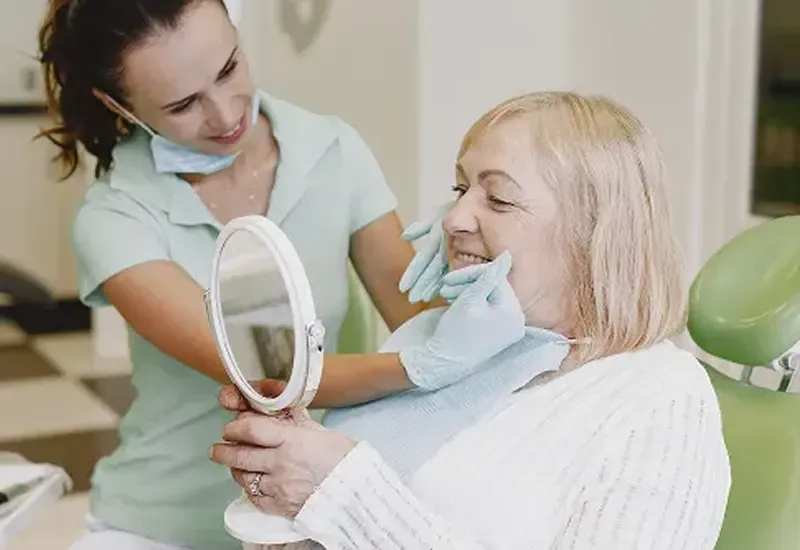Understanding Dentures: Types, Benefits, and What to Expect
by Dr. Azadeh Hosseini
20 August 2025

In the evolving world of oral care and prosthodontic treatment, dentures continue to play a pivotal role in oral rehabilitation. Whether you're facing total tooth loss or need a solution for missing teeth, understanding the different types of dentures, their uses, and what to expect with dentures is essential for making an informed decision.
In this guide, we'll explore complete dentures, partial dentures, and modern denture options, while covering the major benefits of dentures and addressing common concerns like, “Do dentures hurt?” or “Is getting dentures difficult?”

What Are Dentures Used For?
Dentures are removable prosthetics designed to replace missing teeth and surrounding tissues. They serve both functional and aesthetic purposes, offering a reliable dental prosthesis for individuals experiencing tooth loss due to decay, trauma, or aging.
How Do Dentures Work?
Dentures function by sitting securely over the gums and jawbone, mimicking the appearance and performance of natural teeth. Depending on the condition of your mouth and the type of denture chosen, they may be supported by suction, adhesives, or even dental implants.
Types of Dentures: Choosing What Suits You Best
When it comes to prosthodontic treatment, patients have several denture options to consider. Selecting the right type depends on your oral health, number of teeth missing, and long-term goals.
1. Complete Dentures
Also known as full dentures, these are designed for individuals who have lost all their teeth in either the upper or lower arch — or both. Complete dentures rest directly on the gums and are custom-made to fit your mouth after any remaining teeth are removed and tissues heal.

Benefits of Complete Dentures
- Restore full mouth function for speaking and chewing
- Improve facial appearance and structure
- Easily removed for cleaning and sleeping
Are dentures right for me? If you're experiencing widespread tooth loss and desire a non-surgical solution, complete dentures may offer a suitable and effective path to oral rehabilitation.
2. Partial Dentures
Partial dentures are used when one or more natural teeth remain in the upper or lower jaw. They fill in the spaces created by missing teeth and help prevent other teeth from shifting.
Features of Partial Dentures
- Typically held in place with metal clasps or precision attachments
- Offer a more stable chewing experience than gaps
- Designed to match the color and shape of your existing teeth
Is getting dentures difficult? With advancements in digital imaging and materials, getting fitted for partial dentures is now more comfortable and precise than ever.
Benefits of Dentures: Why They Still Matter
Despite modern alternatives, the benefits of dentures remain compelling — especially for those looking for affordable, accessible, and effective denture options.
1. Restored Functionality
Dentures allow you to eat a variety of foods again, restoring essential nutrition and quality of life.
2. Enhanced Appearance
They support facial muscles and prevent the sunken look that often follows tooth loss, promoting a more youthful appearance.
3. Boosted Self-Confidence
A full smile helps reduce self-consciousness in social and professional settings.
Do dentures hurt? While some discomfort is expected initially, modern materials and fittings make the process much more comfortable than in the past. Your dentist can make adjustments to alleviate any issues.
What to Expect With Dentures: A Patient-Focused Guide
Getting dentures is a process — not just a single appointment. Understanding what to expect with dentures can help ease anxiety and prepare you for a smoother transition.
Initial Consultation
Your dental professional will assess your oral health, take impressions, and discuss the best denture options for your situation.
Fitting and Adjustment
Custom molds ensure the denture fits snugly and comfortably. You may need several visits to fine-tune the fit during the healing phase.
Are dentures right for me? If you're considering removable prosthetics for lost teeth, your dentist will help determine if you’re a good candidate for complete dentures, partial dentures, or another form of dental prosthesis.
Adaptation Period
Wearing dentures requires a period of adjustment. Here’s what to expect with dentures in the first few weeks:
- Speech adjustments: You may need practice pronouncing certain words
- Eating softer foods: Initially, softer textures are easier to manage
- Increased saliva: This often normalizes within a few days
- Mild soreness: Temporary discomfort can occur as your mouth adjusts
Modern Denture Options and Innovations
The world of prosthodontic treatment has advanced significantly in recent years. Today’s denture options are lighter, more flexible, and more natural-looking than ever before.
Removable Prosthetics That Work Like Natural Teeth
New materials and digital scanning make removable prosthetics fit better and last longer, reducing the chances of slippage or discomfort.
Digital Denture Technology
Digital workflows allow for faster, more precise denture creation — reducing human error and enhancing patient satisfaction.
Adjusting to Life With Dentures: Tips and Realistic Expectations
Whether you're fitted with complete dentures or partial dentures, it takes time for your mouth, muscles, and mind to adjust. Understanding what to expect with dentures post-fitting can make the transition smoother and less stressful.
Daily Habits and Care Essentials
To get the most from your new dental prosthesis, proper maintenance is key:
- Clean your dentures daily with a soft brush and non-abrasive cleanser
- Rinse them after meals to prevent food buildup
- Soak them overnight in a denture solution to retain shape and cleanliness
- Keep your gums and tongue clean with a soft-bristle brush or damp cloth
These simple habits not only maintain hygiene but also extend the lifespan of your removable prosthetics.
Do dentures hurt after a few weeks? Minor irritation may continue if adjustments are needed. Don’t ignore discomfort—your dentist can fine-tune the fit to relieve pressure points.
Speech, Eating, and Social Interactions: Rebuilding Confidence
As part of your oral rehabilitation, regaining natural speech and eating patterns may take some practice.
Speech Readjustment
You may initially notice minor speech changes with both complete dentures and partial dentures, especially when pronouncing "s," "f," or "th" sounds. Practicing aloud (e.g., reading or talking to yourself) can help retrain your tongue.
Eating Tips for Beginners
Start with soft foods, cut into small pieces. Gradually introduce firmer items as comfort improves. Avoid sticky or overly hard foods early on to protect the structure and avoid slippage.
Is getting dentures difficult? The emotional and physical adjustment might feel overwhelming at first, but consistent care and follow-up appointments will ease the process.
Living With Dentures: Comfort and Everyday Benefits
Dentures are a dependable solution for restoring both function and appearance after tooth loss. They support natural speech, chewing, and smiling, while being simple to remove and maintain. Initial discomfort usually fades as the mouth adjusts, with minor adjustments ensuring long-term comfort. Along with restoring daily function, dentures help maintain facial structure and prevent sagging, offering lasting confidence and improved quality of life.
Final Thoughts
Choosing the right types of dentures and understanding the process involved is essential to restoring your smile and oral health. Whether you're considering complete dentures, partial dentures, or newer denture options, the goal is always the same: to regain confidence, comfort, and function. By staying informed on what to expect with dentures and how they fit into your lifestyle, you're one step closer to successful oral rehabilitation. With advancements in prosthodontic treatment and growing awareness of how removable prosthetics improve everyday life, there's never been a better time to explore this restorative dental solution. Keep in mind that while questions like "Are dentures right for me?" or "Do dentures hurt?" are common, the right guidance and care will help ensure a smooth transition into this new chapter of your smile journey.
Contact your Concord dentist, Dr. Azadeh Hosseini, DDS, at Top Concord Dental to learn more about Understanding Dentures: Types, Benefits, and What to Expect.
Resource:
Dental Crowns and Caps: What’s the Difference and Which Do You Need?
Disclaimer
*This media/content or any other on this website does not prescribe, recommend, or prevent any treatment or procedure. Therefore, we highly recommend that you get the advice of a qualified dentist or other medical practitioners regarding your specific dental condition. *
